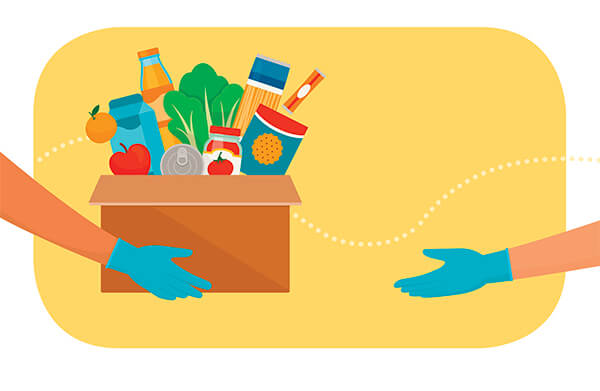Reaching out


When COVID-19 struck a painful blow to California, it didn't take long for people around the state—including those in the hard-hit rural community—to respond to support those who needed help. Here's a look at some of those efforts.
Food banks get boost in support
California farmers and agricultural businesses quickly responded to local food banks and organizations struggling to meet increased demand. The Farm to Family program beefed up its statewide efforts in a $15 million campaign that will distribute millions of pounds of food donated by farmers and ranchers to more than 40 food banks. A partnership between the state Department of Food and Agriculture and the California Association of Food Banks, Farm to Family works with nearly 130 farmers and has recently connected 200 additional farmers directly to local food banks.
Family Meal provides food and employment
In Sacramento, a chef-driven initiative called Family Meal has helped people in need while putting restaurant employees to work and keeping the food supply chain moving. Created as a partnership among five restaurants and supported by community donations and government funds, Family Meal was organized to supply free, pre-cooked meals during the shelter-in-place period. More than 50,000 meals were funded and served within the first two months of the program, and organizers are currently working to scale Family Meal statewide.
Communities support online livestock auctions
When county fairs across the state were canceled, the fallout included junior livestock auctions. Event organizers, supporters and county Farm Bureaus jumped in to ensure 4-H and FFA students had the opportunity to sell their animals through online auctions. In Tulare County, for example, organizers of the Porterville Fair turned to social media, declaring, "Here's a golden opportunity to fill your freezer with high-quality meat and support the kids at the same time." In five days, all of the animals were sold.
Teen's website connects to local farms
Hearing that members of his community were eager to acquire local produce during the pandemic, a 14-year-old San Diego teen created a website called Farm Connect to link them with local farmers for purchases and deliveries. A link on his site to the San Diego County Farm Bureau provides a lengthy list of direct-market farms.
Ag in the Classroom helps parents transition into teachers
As learning moved from school classrooms into homes throughout the state, the California Foundation for Agriculture in the Classroom pitched in to help teachers, parents and students with a program called #LearnAboutAg@Home. Lessons on LearnAboutAg.org teach students about their food sources with hands-on activities such as making butter, learning about honeybees and planting gardens.
Distilleries pump out hand sanitizer
When hand sanitizer became nearly impossible to find on store shelves, dozens of distilleries in California shifted their focus to crafting small batches of alcohol-based sanitizer to support public-safety efforts. Several, including Dry Diggings Distillery in El Dorado County, donated hundreds of gallons of hand sanitizer to first responders, health-care professionals, nursing homes and organizations working with at-risk populations. Blinking Owl Distillery in Orange County donated more than $10,000 in sanitizer to Southern California hospitals.

